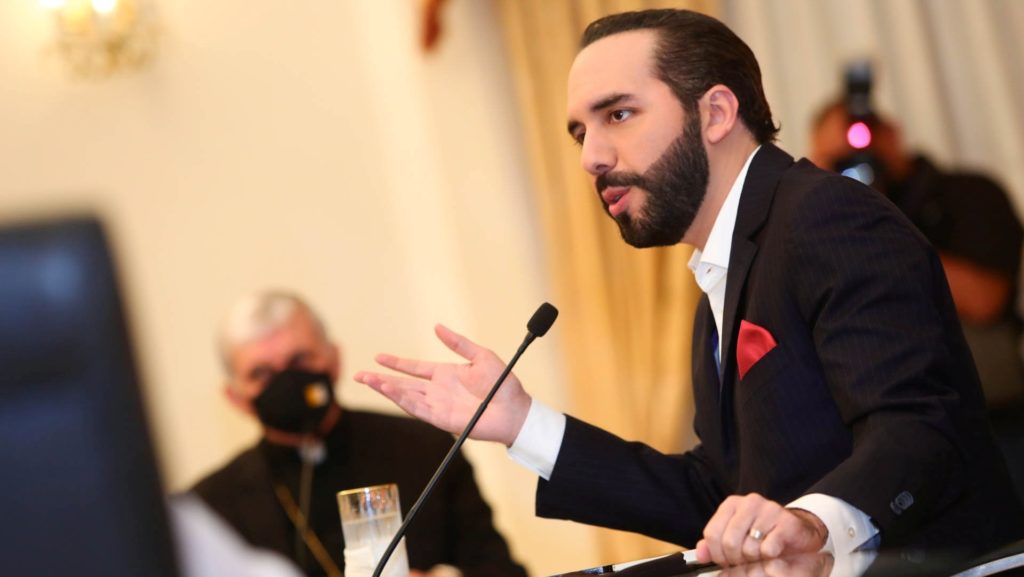Archbishop José Luis Escobar Alas of San Salvador issued a pair of petitions for lawmakers during a Mass celebrated for the feast of the Divine Savior, observed in the country to commemorate the Transfiguration. Both petitions ventured into the realm of politics.
The first request was to scrap a law reversing a ban on mining -- a prohibition championed by the Salvadoran church. The second request was that lawmakers reverse a constitutional amendment eliminating presidential run-off elections. "For a constitutional reform to be legitimate, the people must be consulted," Archbishop Escobar said in his Aug. 6 homily.
The archbishop's comments marked increasing outspokenness from the Salvadoran Catholic Church amid concerns over democratic erosion, environmental degradation and threats to personal liberties in the Central American country.
It also follows President Nayib Bukele pushing a reform to allow for indefinite presidential reelection and push ahead the date of the next election to 2027. The National Assembly, where the president's New Ideas party holds nearly all of the 60 seats, approved the measures with minimal discussion.
"Many of us do not feel free," Cardinal Gregorio Rosa Chávez said during an Aug. 4 homily.
"The world we want is now being denied. It's a world in which we want to live (in) a democracy, which entails dialogue, respect for human dignity, tolerance for our human rights and a free people," Cardinal Rosa Chávez continued. "There's no one who is going to defend us at the official level. Anything will be possible in terms of arbitrary actions."
Bukele was elected in 2019 amid deep dissatisfaction with the two main political parties, which had traded power between them but failed to pull people out of poverty and presided over rampant insecurity.
The president's popularity reached 90%, according to CID Gallup, as he cracked down on predatory gangs, declaring a state of emergency in 2022 in which police arrested nearly 2% of the male population.
Bukele built a megaprison to house them, but human rights lawyers said due process was lacking and many innocent people were locked up. Crime levels collapsed, however, and Bukele often boasted El Salvador had one of the lowest homicide rates in the hemisphere and tourism was booming.
Bukele has also started to target critics. Ruth López, a lawyer with human rights group Cristosal and fierce government critic, was arrested in May and accused of embezzlement. Cristosal subsequently suspended operations.
The Assembly also approved a foreign agents law, which requires organizations receiving foreign funding to have their sources of money approved by the government. The government can also apply a 30% tax on these groups' donations.
"The fear is no longer just affecting civil society and NGOs, but the general public," Juan Meléndez, country director for the Netherlands Institute for Multiparty Democracy, told OSV News. "Businessmen are scared. Students are afraid of expressing their opinions or even conducting academic research. They're afraid because it could be detrimental to the government. A simple question could cost you your life."
The Jesuit-run Central American University José Simeón Cañas has been a rare institution to speak out against the president.
"Today, the ruling party has reached the point of no return, both in its desire and its need to cling to power," the university said in an Aug. 4 editorial.
"The Salvadoran people deserve trustworthy institutions, transparent processes, and real opportunities to decide. With the new constitutional reforms, El Salvador is returning to its past. To a past of absolute concentration of power in family clans and deep corruption of public institutions."
Bukele has forged a close relationship with U.S. President Donald Trump. The Salvadoran president agreed to incarcerate some 252 Venezuelan migrants sent from the United States in the megaprison, which is officially known as the Terrorism Confinement Center. The Venezuelans were repatriated to their home country in July after 125 days in what they described as nightmare conditions.
"We ask our leaders not to promote this country as if it were a giant international prison," the Salvadoran bishops' conference said in a May 29 pastoral letter. "Bringing in major criminals could become a danger to our population, as well as earn this nation a bad international reputation."
They added, "We would not like our compatriots to be imprisoned in other nations."
A Catholic source in El Salvador said discontent was starting to simmer over Salvadorans being deported from the United States, despite Bukele's close relationship with Trump.
"People didn't like the fact that when (Bukele) went to see Trump, he didn't really get anything for Salvadorans" but agreed to imprison Venezuelans, the source said, who requested anonymity to speak freely.
Bukele remains popular, according to analysts, but a June survey from the Central American University found nearly 60% of respondents fearful of criticizing him, saying it was likely they would suffer "negative consequences."
"People don't feel like they can have an opinion anymore," the Catholic source said.

